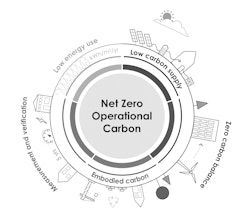LETI was formed in 2017 and consists of a voluntary network of over 1,000 built environment professionals, working to stimulate policy and practice towards a zero-carbon future.
2019 marked an unprecedented acceleration of global climate action, with the impacts of climate change and ecosystem collapse becoming increasingly apparent. Clients, regulatory bodies and local authorities have set a high bar with declarations of climate emergency and carbon neutrality. LETI's key deliverable in 2019 was to provide clarity and coherence to the climate emergency. The Climate Emergency Design Guide outlines the key contributory elements towards a zero carbon built environment, with detailed guidance by building type and an established framework of its influence at the national scale. The Net Zero Carbon one-pager communicates these key principles in an easy to digest format for multiple stakeholders. And the Embodied Carbon Primer provides much needed design guidance to reduce the 'upfront' emissions associated with construction, maintenance cycles and ultimately the capacity for reuse.

Both James Woodall and Sabrina Friedl actively contributed to the above documents and continue to play roles shaping LETI's future work, with Allies and Morrison committing their time throughout 2019 and sponsoring the launch event for the three documents in January 2020. We have actively promoted the formation and dissemination of LETI's response to the ongoing Part L/Future Homes Standard, ensuring that our country's regulatory framework aligns with the government commitment to Net Zero Carbon.
Together, these documents provide the perfect platform for different stakeholders to facilitate meaningful change and help navigate the route to zero carbon. For our practice, these form valuable tools to help us better inform our clients and safeguard built assets, whilst delivering on our commitments to both Architects Declare and the RIBA 2030 Challenge.